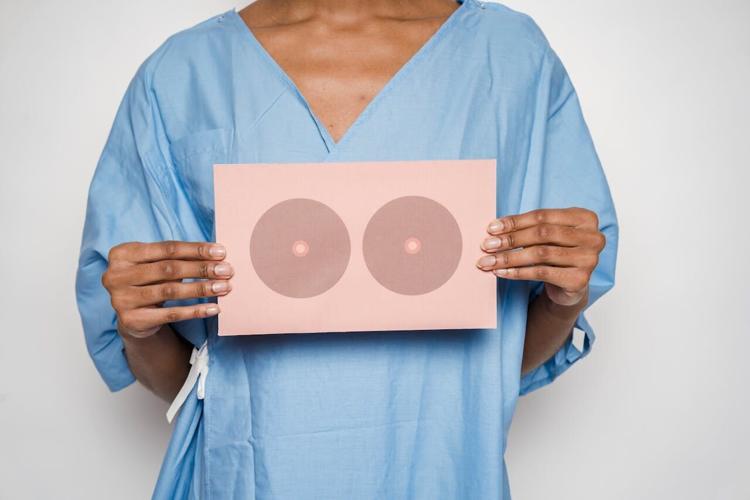
Photo by Anna Tarazevich via Pexels
Stephen Beech
Women at high risk of developing breast cancer between regular check-ups have been identified using AI technology.
Cambridge University researchers showed the potential of a new AI tool to help identify those at higher risk of developing "interval breast cancers" - cases that are diagnosed between regular screening mammograms.
Study co-author Dr. Fiona Gilbert said: “Interval cancers generally have a worse prognosis compared with screen-detected cancers, because they tend to be either larger or more aggressive.
"That’s why it’s important to minimize the number of interval cancers that you have in any screening program.”

Photo by Klaus Nielsen via Pexels
Using data from the U.K.’s triennial screening program, Dr. Gilbert and lead researcher Joshua Rothwell employed AI to identify women for supplemental imaging to find interval cancers.
Dr. Gilbert said: “Personalized breast cancer screening depends on accurately assessing an individual’s risk of developing breast cancer within a specific timeframe.
“We can use supplemental imaging and adjust screening frequency based on a woman’s breast density and likelihood of developing breast cancer within a short timeframe.”
The study included 134,217 screening mammograms on the same number of women, aged 50 to 70, with 524 interval cancers.
The exams were performed between 2014 and 2016 at two U.K. triennial Breast Screening Program centers using two different mammography systems.
Negative - no cancer found - digital screening mammograms were processed by Mirai, a deep learning-based algorithm, producing a generalized risk score for developing an interval breast cancer.
The AI tool primarily uses information from the mammogram, including tumor features and breast density, to make a risk prediction.
The AI tool’s three-year risk scores retrospectively predicted 3.6%, 14.5%, 26.1% and 42.4% of the 524 interval cancers for women assigned the highest 1%, 5%, 10% and 20% scores.
Identification of the interval cancers is equivalent to an additional cancer detection rate of 0.1, 0.6, 1.0, and 1.7 per 1,000, according to the findings published in the journal Radiology.

Photo by Thirdman via Pexels
Rothwell, a Cambridge doctoral student, said: “Our results suggest that further workup of mammograms within the top 20% of scores could yield 42.4% of interval cancers, meaning that Mirai could be used to identify women for supplemental imaging or a shortened screening interval, instead of or in addition to breast density."
The AI tool performed better at predicting interval cancers within a year of the screening examination compared to 12 to 24 months or 24 to 36 months later.
While the tool was less effective in women with extremely dense breast tissue, it showed superior performance compared to conventional risk prediction tools.
In the U.K., 2.2 million women are screened for breast cancer every year.
Dr. Gilbert says AI could help optimize the country’s triennial breast cancer screening program by improving the selection criteria for women who could benefit from supplemental imaging, such as MRI or contrast-enhanced mammography, or by shortening the screening interval.
She said: “If we called back 20% of women for supplemental imaging, we’d have to find the capacity to offer contrast-enhanced mammography or MRI to 440,000 women."
The research team now plans to compare commercially available predictive AI tools as well as conduct economic modeling and a cost-effective analysis, and a trial utilizing predictive AI to identify women most likely to benefit from supplemental breast imaging following screening mammography.
Prof Gilbert, of Cambridge's department of radiology and honorary consultant radiologist at Addenbrooke's Hospital, added: “Identifying women at an increased risk of developing breast cancer is a complex, multifactorial problem.
“The goal is to accurately identify the women most likely to have an interval cancer while minimizing the volume of supplemental imaging performed.”























(0) comments
Welcome to the discussion.
Log In
Keep it Clean. Please avoid obscene, vulgar, lewd, racist or sexually-oriented language.
PLEASE TURN OFF YOUR CAPS LOCK.
Don't Threaten. Threats of harming another person will not be tolerated.
Be Truthful. Don't knowingly lie about anyone or anything.
Be Nice. No racism, sexism or any sort of -ism that is degrading to another person.
Be Proactive. Use the 'Report' link on each comment to let us know of abusive posts.
Share with Us. We'd love to hear eyewitness accounts, the history behind an article.